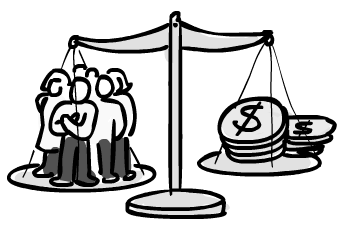How do you refer to your company or team culture? Do you refer to yourself and your immediate team as "we" or "us" and to your company or extended team as "they" or "them"? If you do, do you think this is a problem? I do. For arguments sake, let's refer to you as a non-zombie and we'll refer to your extended team or company as the potential zombies.
Though it was fun back in the 5th grade to play a game of tug of war with your classmates, it's not so cool when you're working in a corporate environment. Projects can be challenging enough. You shouldn't have to be distracted by other groups who don't have the same high level goals or values as yourself. You should be working as a team in order to be successful. But, does your team or company have clearly defined goals or values? I'll ask it a different way. Does your team or company have them written down; you know what they are; and you know what they mean? If not, you and your group are at risk of being part of the zombie culture.
Zombie culture is a lot more common than you might think. Zombies have no specific goals, other than to eat your brain. They're not trying to make you a zombie. Becoming a zombie is merely a byproduct to having been bitten by the undead. They really don't care.
I've said before, don't do something unless it's applicable to meeting a goal. But I bet you're asking yourself right about now, "Derek, if my coworker doesn't smell like rotting flesh or isn't squatting in a corner knawing on a foot, how do I know they are a zombie?" I've compiled a list of a few indicators of zombie culture.
Zombie Culture Indicators
- Hosts meetings...long meetings... several of them...with no agenda... with several invitees.
- Stops by your desk a lot to ask what'cha doin'?
- Withholds information for personal gain
- Just shows up for work and thinks they are doing you a favor
- Farts (Actually, thinking of a farting zombie made me laugh so I thought I would add it)
- Uses the "cc" email feature by default, when the recipient has nothing to do with the conversation
- Uses the "reply-all" email feature to continue conversations that don't pertain to the group
- Is disrespectful
- Is untrustworthy (with throw you under a bus)
- Does not lead by example
- Tries to impress everyone by how smart they are. (that's a more advanced zombie type)
I can go on and on but I really don't like negative posts. Let's turn this around. What values can you and your team have that will have zombies avoiding you like the perfume department of the local Macy's department store?
Values to Repel Zombie Culture
- Deliver WOW Through Service
- Embrace and Drive Change
- Create Fun and A Little Weirdness
- Be Adventurous, Creative, and Open-Minded
- Pursue Growth and Learning
- Build Open and Honest Relationships With Communication
- Build a Positive Team and Family Spirit
- Do More With Less
- Be Passionate and Determined
- Expect to deliver the extraordinary
- Treat others with respect
- Promote collaboration and teamwork
- Encourage creativity and risk-taking
- Make and meet our commitments
- Trust and support one another
- Be Humble
I'm going to admit, I didn't think up those awesome zombie-repelling values. I got them from Zappos and VersionOne. I'm going to go out on a limb and say I don't think either of those organizations have zombie cultures. Can you say the same for yours?
Like the image? Find them at Pictofigo





 I was in a contract negotiations meeting for several hours yesterday. The most notable quote came after the customer was asking for the basis of estimates for the scope of work being proposed.
I think both the vendor and customer could have done a lot better if they had just valued
I was in a contract negotiations meeting for several hours yesterday. The most notable quote came after the customer was asking for the basis of estimates for the scope of work being proposed.
I think both the vendor and customer could have done a lot better if they had just valued 



